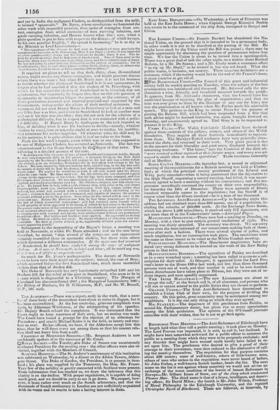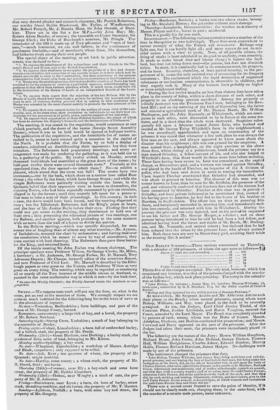EDINBURGH TORY MEErmo.—The Anti-Reformers of Edinburgh have at length held
what they call a public meeting ; it took place on Monday. The Lord Provost was requested, it is said, to call it, but declined. It might have been somewhat awkward for a public officer to summon the public to a meeting from which they were to be purposely excluded; and any disorder that might have ensued could hardly have failed to re- act upon him. The gentlemen who desired to give a proof of their courage to their townsmen, were thus reduced to the alternative of call- ing the meeting themselves. The requisition for that purpose contains about 280 names; some of well-known, others of little-known men, others of men who unless in the requisition were never heard of before. Sir John Forbes, a well-known Scotch banker, heads the list. The next name on the list is one against whose notoriety we would not advise an exchange of the worst condition of the lowest of honest Reformers in Europe—Mr. Gilbert Innes of Stow, one of the Jury which condemned Thomas Muir. The third name is that of a brave, intelligent, and deserv- ing officer, Sir David Milne; the fourth is Mr. John Wilson, Professor of Moral Philosophy in the Edinburgh University, and the reputed Christopher North of Blackwood, These are followed, at intervals, by that very shrewd pleader and eccentric character, Mr. Patrick Robertson, our worthy friend Baillie Black wood, Mr. Tytler, of Mroodhouselee, Mr. Robert Forsyth, Mr. J. Shanks More, Sir John Oswald, of Duni- kier. There are in the list a few M.P.s,—Sir John Hay; Mr. Robert Adam Dundas, of course ; the venerable ex-Under Secretary, Sir George Clerk ' • the Duke of Buccleugh's nominee, Mr. Pringle. The remainder of the 280 is made up of Tory advocates and " men of busi- ness,"—much interested, we can well believe, in the continuance of parchment freeholds,—and of merchants whose fame, like themselves, had hitherto dwelt among their own people.
The special object of the meeting, as set forth in public advertise. ments, was declared to be- " 1. To express the attachment of the subscribers and their friends to his Ma- jesty's Person and House, and to the British Constitution.
" 2. To express their readiness to recognize the propriety of a free and dispas- sionate consideration and correction of any specific abuses or detects which may be shown practically to exist in the Constitution, but their conviction of the ruinous consequences that would arise from any general reconstruction of that Constitution. " 3. To express the gratification they feel that no further creation of Peers has been resorted to for the purpose of carrying a particular measure, notwithstanding sug- gestions to that effect from various quarters, which, if acted upon, would hare led to the destruction of the House of Lords as an independent branch of the Legis- lature.
" 4. To express their regret that the rejection of the late Reform Bill by the House of Lords should have been made a pretext for inciting the ignorant and un- wary to acts of violence, feeling assured that in coming to that resolution that House was actuated by the most sfitcere anxiety to promote the best interests of the country. "5. To express their own earnest desire for the welfare of every class of the com- munity, and, at the same time, their resolution as individuals to use their best en. deavours for the preservation of public peace, and the support of law and order. "6. To express their reprobation of those Political Societies, the object of which has been to overawe his 'Majesty's Councils and the deliberations of Parliament."
The meeting, it was stated in the requisition, would commence at one o'clock precisely, and the doors of the rooms (George Street Assembly Rooms), where it was to be held would be opened at half-past twelve. The publication of the requisition, and the formidable list of names at- tached to it, seems to have created quite a sensation in the capital of the North. It is probable that the Tories, by so bold a display of numbers, calculated on dumbfounding their opponents: but they were mistaken. The Reformers held preparatory meetings, and every ar- rangement was made for rendering the gathering, as it was held out to be, a gathering of the public. By twelve o'clock on Monday, several thousand individuals had assembled at the great doors of the rooms ; by half-past twelve there were several thousands more.* Precisely at the appointed time, the door opened—to admit them ? No—to exhibit a placard, which stated that the room was full 1 The rooms have two entrances,n-one by the back, which shuts on a narrow lane called Rose Street ; the other by the front, which faces George Street ; and while the simple Reformers were patiently waiting outside the latter, in the Quixotic belief that their opponents were as honest as themselves, the cunning Tories, who had been especially summoned by private circulars, slipped in by the former • until they scarcely left space for a penny-a- line man to take a note of their proceedings. In this.country, in such a case, the doors would have been forced, and the meeting dispersed at once ; but the Edinburgh Reformers had the King's peace at heart, and the fear of Mr. Justice Boyle before their eyes. Finding that they could not get access to the meeting, they determined to hold one of their own ; thus presenting the whimsical picture of two meetings, one for Reform, and another against, both proceeding at the same moment with no more than the wall of a house to divide the parties.
In the Reform meeting,—which was speedily despatched, for men sooner tire of laughing than of almost any other exercise,—Mr. Aytoun, of Inclidairnie, assumed the chair by acclamation ; and having read over the resolutions which he meant to move by way of amendment, they were carried with loud cheering. The Reformers then gave three hurras l'or the King, and returned home. Of the inside meeting Sir John Forbes was chosen chairman. The principal speakers were Professor Wilson, Sir George Clerke, Mr.Milne, a barrister ; a Mr. Anderson, Mr. George Forbes, Mr. D. Macneil, Tory Advocate-Depute ; Mr. Cheape, formerly editor of the notorious Beacon, and now Professor of Civil Law. Mr. Macneil is described by the Edin- burgh papers as very great on the Unions, and Professor Wilson as very great on every thing. The meeting, which may be regarded as combining all or nearly all the Tory interest of the middle classes in Scotland, se_ parated in the same unobtrusive way in which it met—by the back-door.
• So says the Weekly Chronicle; the Weekly Journal treats the numbers as con- temptible.



























 Previous page
Previous page